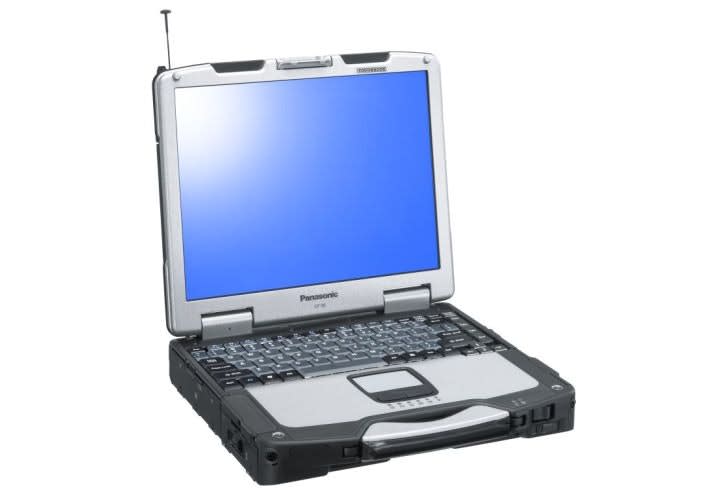Panasonic Computer Solutions Company, manufacturer of durable, reliable Panasonic Toughbook mobile computers, today announced its fully rugged line and Toughbook U1 are the first to be certified by an independent third party test lab to meet the newer and more demanding MIL-STD-810G standard for environmental conditions, which was issued in October 2008 and supersedes MIL-STD-810F. The announcement was made at the company's annual meeting of its Toughbook Premier Partners (TP3), an elite group of resellers and solution providers, in Scottsdale, Ariz.
The Toughbook 30 laptop, Toughbook 19 convertible tablet, and Toughbook U1 ultra mobile handheld replacement have passed 20 critical MIL-STD-810G tests applicable to mobile computers, as well as IP65 ingress protection and ASTM D4169-04 vehicle vibration tests. Testing was conducted and certified by an internationally respected third-party laboratory.
MIL-STD-810G and Beyond
Mobile computing environments are often more demanding than what is laid out in military standard testing criteria. Because of this, Panasonic had its Toughbook 19, 30, and U1 tested beyond MIL-STD-810G, based on its 15 years of customer experience managing mobile deployments in extreme conditions. In particular, all of the products were drop tested 26 times at four-, five-, and six-foot levels. While MIL-STD-810G allows up to five samples to be used, Panasonic only used one unit for the Toughbook 19, 30, and U1. Even more noteworthy, the same unit was used for the 26 drops at 4 feet, then the same unit was dropped again 26 times from a height of 5 feet, and then the same exact unit was dropped 26 times from a height of 6 feet. In short, each unit tested survived 78 drops between heights of 4 and 6 feet.
"Most people are not aware that the military itself does not test products but only provides guidelines. As a result, there is actually a lot of flexibility in conducting military standard testing, which has made for an environment in which vendor claims about durability have actually gone untested," saya Kyp Walls, director of product management at Panasonic Computer Solutions Company.
"For example, many companies will use multiple devices to pass the 26 angle military standard drop test method. This level of slack means that some products can be identified as mil-spec, yet not reflect real-world performance needs. This is unacceptable according to Panasonic's-and our mission-critical customers'-standards."
MIL-STD Testing
MIL-STD-810G is a series of testing standards and procedures issued by the United States Army, in order to identify products approved for use by all agencies and organizations within the Department of Defense. While these procedures were initially created specifically for the military, they have since become an important benchmark for numerous public and private sector organizations to verify if products will withstand challenging conditions throughout their service life.
"There's a common misconception that products can receive a blanket 'military standard certification' verifying the device is rugged in all respects," says Walls. "This is not the case. There are numerous tests and each test is broken down into different procedures. Tests can be modified, which is generally used as an excuse by vendors to make them easier to pass. However, Panasonic did not modify any MIL-STD-810G tests to try to water them down or make them easier.
Rather, Panasonic has modified a test to make it more challenging and indicative of something a product could face in the real world. Although these military standard tests are self regulated and do not require third party verification, Panasonic testing is conducted and certified by an internationally respected third party laboratory.
"Companies interested in buying mobile computers that declare some level of military testing need to ask about the specific tests that were conducted, the number of devices required to pass each test, if the tests were modified and who conducted and verified the test results," adds Walls.
Panasonic's reliability (as indicated by extremely low failure rates), is backed by a three-year standard warranty and Toughbook users rely on the company's extensive market knowledge, strong channel partnerships, unmatched customer support, financing, and a host of other options.
IP65 Testing
Panasonic fully rugged mobile computers and the Toughbook U1 ultra-mobile-rugged computer are sealed and can be used in rain, snow, dust, desert storms, and other hostile environments. Other unsealed devices can have internal components exposed to contaminants, which then introduce a point of failure in mission-critical environments.
Ingress Protection Rating testing for the Toughbook 19, 30, U1 was conducted and certified by an internationally respected third-party laboratory adhering to IEC 60529 Sections 13.4, 13.6.2 for IP6x testing (dust), and Sections 14.2.5, 14.3 for IPx5 testing (water). The IP6x testing was conducted in a dust chamber for a total of 8 hours using talcum powder while the units were non-operating. The IPx5 testing was conducted by spraying the unit with pressurized water at the rate of 3.33 gallons per minute, from all practicable directions.
For more information about Panasonic Toughbook mobile computing solutions, visit www.panasonic.com/toughbook.












